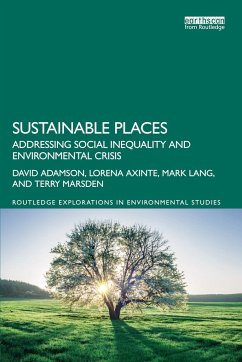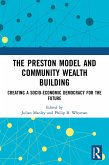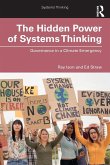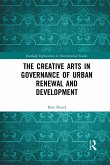This book calls for more holistic place-based action to address the social and environmental crisis, deploying the Deep Place approach as one contribution to the toolbox of actions that will underpin the UN Decade of Action towards the Sustainable Development Goals.
The authors suggest that 'place' is a critical window on how to conceive a resolution to the multiple and overlapping crises. As well as diagnosing the problem (the world as it is), this book also offers a normative advocacy (the world as it could/should be and proposed pathways to get there). A series of 'Deep Place' case studies from the UK, Australia, and Vanuatu help to illustrate this approach. Ultimately, the book argues for the need for a real and green 'new deal' and identifies what this should be like. It suggests that a new economic order, whilst eventually inevitable, requires radical change. This will not be easy but will be essential given the current impasse, caused, not least by the conjunction of carbon-based, neoliberal capitalism in crisis and the multifactorial global ecological crisis. Ultimately, it concludes that there is a need to develop a new model of 'regenerative collectivism' to overcome these crises.
This book will be of interest to academics, policy practitioners, and social and climate justice advocates/activists.
The authors suggest that 'place' is a critical window on how to conceive a resolution to the multiple and overlapping crises. As well as diagnosing the problem (the world as it is), this book also offers a normative advocacy (the world as it could/should be and proposed pathways to get there). A series of 'Deep Place' case studies from the UK, Australia, and Vanuatu help to illustrate this approach. Ultimately, the book argues for the need for a real and green 'new deal' and identifies what this should be like. It suggests that a new economic order, whilst eventually inevitable, requires radical change. This will not be easy but will be essential given the current impasse, caused, not least by the conjunction of carbon-based, neoliberal capitalism in crisis and the multifactorial global ecological crisis. Ultimately, it concludes that there is a need to develop a new model of 'regenerative collectivism' to overcome these crises.
This book will be of interest to academics, policy practitioners, and social and climate justice advocates/activists.
"In the context of the multiple and conjoined crises, contradictions, contingencies, and extremities facing our planet, Sustainable Places is an original and important statement on the power of place to act as that fulcrum of hope to shape a better foundational world. Rich in conceptual framings and empirical nuances, this book is recommended reading for boffins, bureaucrats and all parties interested in understanding why and where geography increasingly matters. Carbon-based neoliberal global capitalism is in crisis, but there are alternatives".
Professor Martin Jones, Vice-Chancellor, Staffordshire University
"The Deep Place approach offers hope at a moment when the decades-long push to globalise everything is crumbling under the pressures of war, disease, and social tensions of private wealth and social impoverishment. Having long pioneered theory and praxis of sustainable place-making, the authors help us shift away from a negative, fearful mindset --- one that fails to see the possibility to change the institutions that inflict harms on one another and on earthly conditions of all life. Beginning with each specific place, human groups can reconnect in life-enhancing ways both within places of all sizes, and across places. This work offers inspiring examples of embryonic practices to guide democratic transitions towards collective wealth and wellbeing."
Professor Harriet Friedmann, University of Toronto
"The book is a helpful distillation of what elsewhere might be called a conjunctural approachvi, knitting together the local and global, the political, economic, social and ecological, in the context of intersecting and accelerating systemic crises, with Place as the uniting theme."
Mark H Burton, Steady State Manchester
Professor Martin Jones, Vice-Chancellor, Staffordshire University
"The Deep Place approach offers hope at a moment when the decades-long push to globalise everything is crumbling under the pressures of war, disease, and social tensions of private wealth and social impoverishment. Having long pioneered theory and praxis of sustainable place-making, the authors help us shift away from a negative, fearful mindset --- one that fails to see the possibility to change the institutions that inflict harms on one another and on earthly conditions of all life. Beginning with each specific place, human groups can reconnect in life-enhancing ways both within places of all sizes, and across places. This work offers inspiring examples of embryonic practices to guide democratic transitions towards collective wealth and wellbeing."
Professor Harriet Friedmann, University of Toronto
"The book is a helpful distillation of what elsewhere might be called a conjunctural approachvi, knitting together the local and global, the political, economic, social and ecological, in the context of intersecting and accelerating systemic crises, with Place as the uniting theme."
Mark H Burton, Steady State Manchester








